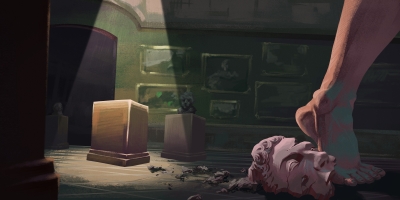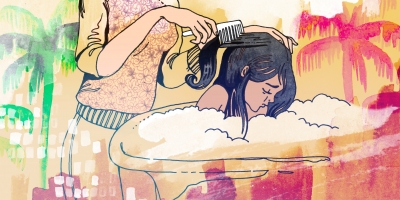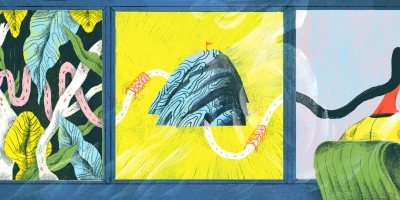Nonfiction
We Forgot About the Flowers
by Blaise Allysen Kearsley

Like I always say, I’m not really a sports person. I don’t do sports; I don’t care about sports. When people talk about sports, I do not know what they are saying. Then I remember that I was a figure skater. For ten years.
It should come as no surprise to you that it all started with the 1978 romantic drama Ice Castles. It was one of my all-time favorite movies. (There was a remake in the early 2000s, but I think it’s best for everyone if we just pretend like that never happened.) In Ice Castles, Lynn-Holly Johnson plays Lexie Winston, a sixteen-year-old figure skater from a one-horse town in Iowa who gets discovered by a world-class trainer and goes from total obscurity to the cover of Sports Illustrated. She has a hockey player boyfriend named Nick Peterson, played by Robby Benson as you’ve never seen him before. Seriously, in Ice Castles, Robby Benson is tough and irreverent and he’s really complicated. He’s always running his fingers through his messy hair and he says “HELL” all the time. Like, “Beats the HELL outta me!” or “I don’t even know what the HELL I’m doin’ this for!”
So Lexie becomes this incredible Olympic hopeful, but she’s overwhelmed by all of the sudden attention. One night, tragedy strikes. She falls on a huge triple axel, which is the most difficult jump in figure skating. She hits her head, and as I’m sure you’ve probably guessed by now, she goes blind. For months, she’s completely despondent. Some dark and despairing Helen Keller/Miracle Worker–type scenes ensue, and eventually, between the discipline of her former trainer and the tough love of her hockey player boyfriend, Nick Peterson, played by Robby Benson as you’ve never seen him before, Lexie eventually decides she wants to skate again.
When I was little, my mother signed me up for figure skating classes. I had short curly hair and buck teeth, and I didn’t have a common girl’s name like Jennifer or April, so in the first class, this girl skated right up to my face, and with a scowl said, “ARE YOU A BOY OR A GIRL?” She seemed angry about it; it was weird. I can’t remember if I answered her or if I just quietly hobbled off the ice in tears, which is entirely possible, but I kept going to the class because I loved skating. The other thing that was happening was: because my parents had split up, I was going back and forth between my mother’s house and my father’s house every other week. And while my dad stayed in the same house my whole life, my mother moved six times.
My parents couldn’t have been more different. My mother was the manipulative, suffocating narcissist and my dad was the charming, reserved narcissist. My mom spent money she claimed not to have, and my dad always said, “Well, I don’t have the kind of money your mother has.” My dad enforced few to no rules, while there were crazy rules at my mother’s house. For example, I wasn’t allowed to sleep with a pillow for some absurd reason, and if I didn’t want her to hold me close when I crawled into her bed to watch game shows, I wasn’t allowed to stay in her bed and watch the game shows. Also, I wasn’t allowed to answer the phone. I had my first boyfriend in seventh grade, whose name was Chase, and whenever he would call me she would ask, “Who’s calling?”, knowing full well who it was. When he’d say, “Uh, it’s Chase,” my mother would say, “And what is this concerning?” I was that girl. I was the girl who had the mother that everyone hated or feared. And if you count the time when I was four, among a few others, that my mother yanked me out of a swimming pool so hard, she pulled my arm out of the socket, you could probably say that she was, on occasion, physically abusive too.
By the time I was twelve, I was a member of the Babson Skating Club in Massachusetts where I grew up. I had a coach whom I loved. I was fitted for custom-made boots with professional blades. Competitive figure skating is expensive, and my mom funded everything. She and I followed skating closely. I watched every televised competition, TV special, interview—all of it. We traveled to the US Figure Skating Championships—“Nationals”—all over the country. We even went to two World Championships, one of which was in Geneva, Switzerland, just to watch the top skaters compete.
It was utterly thrilling. My heart would begin to race the moment we entered the arena. The excitement and tension in the stands was palpable. I would sit there in my knit sweater and itchy, plaid wool skirt with white tights and watch some of my favorite sleek Lycra-clad competitors plow through their programs with precision and determination, and I would think to myself: I wanna do that. I was going on thirteen years old, and I wanted to be a great skater. I wanted to compete in Nationals. I wanted spectators to throw flowers onto the ice after my performance, and then I’d make my way around the rink, picking up the red roses and waving to the crowd, just like Lexie Winston did after skating a perfect program to the instrumental version of the Oscar-nominated song “Looking Through The Eyes of Love” by Melissa Manchester.
At my dad’s house, nothing stopped me from spending endless hours in front of the television. When we first got cable, there were three movie channels, and Ice Castles was on multiple times a day. I was obsessed. I watched as often as I possibly could. Not only did I know the script, I also knew the facial expressions. I knew all the nuances. I knew the way Lexie moved. I wanted to skate like her and emote like her. I wanted to be her. I wanted a hockey player boyfriend like Nick Peterson, played by Robby Benson, and I kind of wanted to have an accident that left me blind—and then I’d learn how to skate again, because that’s incredible no matter how you look at it. Also, Lynn-Holly Johnson, who played Lexie, has a hyphen between Lynn and Holly, and so for an entire year in seventh grade I insisted that Blaise Allysen—my first name and my middle name—was hyphenated on my birth certificate. This was essential.
Despite her eventual fame, Lexie was an outsider, even before she went blind. I always felt like an outsider, too. Except for one Asian American skater named Peter Chin, I was the only non-white member of the Babson Skating Club. I was the only one who warmed up to deep, important music like the album War by U2. For my first exhibition solo, I told my coach that I wanted us to choreograph my program to an instrumental, two-song medley of the beginning of “Stairway to Heaven” and the theme from the movie Terms of Endearment.
Somehow, I was also the only skater whose mother sat up in the wood bleachers, looming over the rink at nearly every practice. Sometimes I’d look up and she’d be watching me intently, spine straight, chin up. I’d say to myself what she always said to me: “If you fall, that means you’re working hard.” Other times I’d look up in the stands to find her disengaged, in workaholic mode, buried in a pile of papers she always lugged around in an oversized canvas shoulder bag.
My mother and I fought a lot, and the fights became worse and more frequent as I got older. So when I was fourteen, I told her that I wanted to live with my dad full-time. She calmly said, “Well, I think that’s a good idea.” So I moved. Except for the things my mother inexplicably wouldn’t let me take, like my cat and my record player, I had all of my belongings in one place for the first time in my life and, despite the devastation of having my pet taken away by the mother who gave her to me, I thought everything was going to be okay. Then, in the months that followed, my mother’s true wrath unfolded. My dad took me to the doctor for a physical, only to discover that I was no longer part of any health plan. He learned from my high-school administrators that my mother would no longer be paying for the private school she’d enrolled me in. And at the rink, I discovered that I was going to lose my regular ice time, as well as my coach. I must have sobbed and cursed my mother’s name for days, vowing never to speak to her again. My dad said, “Well, as far as skating goes, it’s up to you.” This confused me. It was impossible to tell if he was being supportive or passive. I didn’t know how to just ask him if he would, or even could, pay to keep me skating for as long as it took for me to become a champion.
It turned out I could do what they called “walk-ons,” where you just pay for ice time by the hour. That’s what my dad and I settled on, without ever talking about it explicitly. As time went on and I kept doing walk-ons and practicing on my own, without a coach, it started to feel futile. How was I going be a competitive skater now? I went to the rink less and less. On the brighter side, if I didn’t skate, that meant I had more time to talk to my ninth-grade boyfriend on the phone. My dad didn’t seem to care that much one way or another. For a while, with every walk-on I skipped, I had this feeling like I was bailing on a friend. When that feeling dissipated, it was almost as though I’d stopped skating without ever deciding to quit. And though it’s only a small part of the truth, I like to think that I actively decided to quit skating because I wanted to make out with boys.
It’s hard to imagine what my life would’ve been like had I kept going. Like, what if my mother could have tried to put aside her sociopathic need for vengeance because her daughter’s love of skating was more important? Or what if my dad had been able to reassure me that, somehow, we would try to make it work? Or what if—even in the face of all the obstacles—I hadn’t given up? Because, in some ways, that’s exactly what I did.
I remember everything about the way skating felt. I remember feeling like the ice was a respite during some of the worst times of my life. I could take all my anger and work it out on the rink. I could channel it into power, grace, focus, speed. I don’t really talk about skating anymore, but I miss it so much. I miss what I gave away because it’s been too long and I’m too old now to get it back. I no longer follow the sport, and I haven’t been on the ice in years. But I do still have my skates, covered in black scuff marks. They’re like my badge of honor; they show how hard I worked. They’re something tangible. They’re proof that—for a while, anyway—I tried.
Of course, I do own of a copy of Ice Castles. The 1978 version. Whether you’ve seen it or not, or if you’re going to try and watch it online somewhere after reading this I want you to know that somewhere deep, deep, deep down inside of me, I know it’s not a good movie. I know. But it’s a great movie.
So the last thing I’ll say about it is this: There’s this scene where Nick Peterson, played by Robby Benson as you’ve never seen him before, is fighting with Lexie’s dad, played by Tom Skerritt, about whether or not Lexie, having lost her eyesight, should compete again. Lexie’s dad is vehemently against it. “The whole idea is pointless and cruel!” he yells.
Then Nick Peterson slams his fist down on the table and yells back, “Not trying is pointless and cruel! Not trying is wondering your whole life if you gave up too soon! Who the HELL needs that?”





